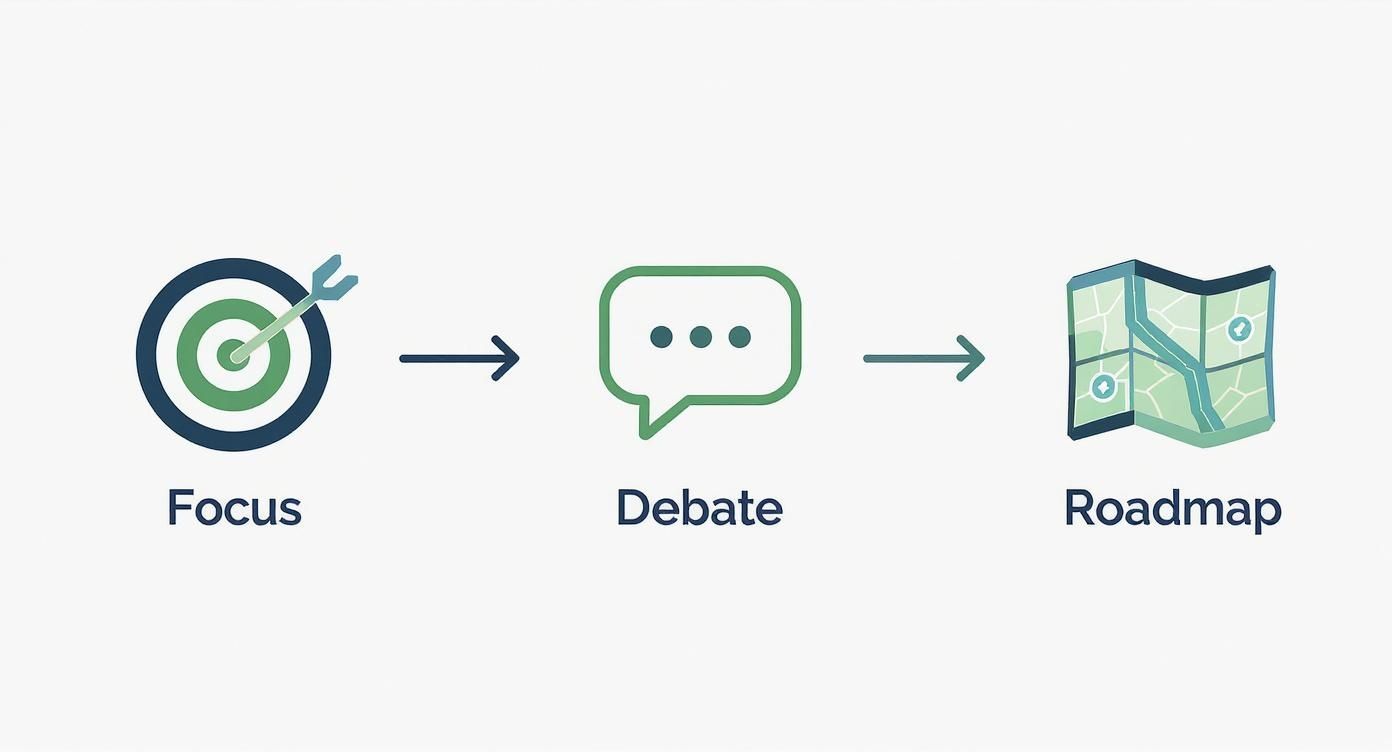
How to Write a Thesis Statement That Commands Attention
November 19, 2025
Let's be honest: your thesis statement is the most important sentence in your entire paper. Get it right, and you’ve given your reader a clear roadmap for your argument. Get it wrong, and you're setting yourself up for a confusing, unfocused mess.
So, what exactly is it? Think of it as your entire argument boiled down to a single, powerful sentence. It has to be a specific, arguable claim that tells the reader exactly what you're going to prove and how.
Why Your Thesis Statement Is a Big Deal
A strong thesis isn’t just a box to check on your assignment rubric; it's the intellectual backbone of your paper. It’s what transforms a random collection of facts and quotes into a focused, persuasive argument. Without one, you're just summarizing information, not analyzing it.
This one sentence does two crucial jobs. First, it acts as your North Star during the writing process, keeping you on track and ensuring every paragraph directly supports your main point. Second, it gives your reader a crystal-clear preview of your argument, making your paper infinitely easier to follow.
The folks at Wikipedia put it nicely—it's a concise summary of your main claim.

The key takeaway here? A thesis isn't just a topic. It's a claim you’re making about that topic—one you have to back up with evidence.
What Goes Into a Powerful Thesis?
To build a thesis that can carry the weight of an entire essay, you need to weave together a few essential elements. Once you get the hang of these, you’ll be able to craft compelling arguments every time.
A truly effective thesis statement needs to be clear, specific, and arguable. Let's break down what that really means.
Key Elements of a Strong Thesis Statement
| Element | Why It Matters | Example |
|---|---|---|
| A Specific Subject | You can't argue about a broad topic like "climate change." You need to zoom in on a manageable piece of it. | "The impact of single-use plastics on marine ecosystems" is much stronger than just "plastic pollution." |
| An Arguable Claim | It can't be a simple fact. It must be a stance that a reasonable person could disagree with. This is what creates room for analysis. | Instead of "Plastic pollutes oceans" (a fact), try "Banning single-use plastics is the single most effective policy for protecting marine life." (an arguable claim). |
| A Clear Roadmap | It should briefly hint at the main points or evidence you'll use to support your claim. This gives your paper a logical structure. | This can be woven in by previewing your key points: "...because it directly reduces ingestion by sea turtles, limits microplastic contamination, and..." |
Mastering these components is what separates a weak, factual statement from a thesis that drives a compelling, well-structured paper.
A great thesis statement is a promise to your reader. It promises that your essay will be focused, arguable, and worth their time. Fulfilling that promise is the key to successful academic writing.
Understanding What Makes a Thesis Statement Work
Most people settle for a topic announcement, but an impactful thesis does so much more. It stakes out a specific claim, one that asks your reader to think, question, and engage. In short, your thesis isn’t a mere signpost—it’s the engine driving every argument you’ll make.
Imagine two sentences side by side:
- Observation: “Social media has an effect on teenagers.”
- Argument: “Social media’s impact on teen self-esteem stems more from peer comparison algorithms than from the content teens choose to view.”
The first simply states a fact. The second throws down a gauntlet.
The Power Of A Debatable Claim
An arguable thesis opens up space for evidence and interpretation. If your claim reads like a report—listing truths everyone already accepts—you’ll never spark debate. Instead, challenge a common assumption or offer a fresh angle that invites pushback.
Consider how a clear dispute shapes your essay:
- Weak (Factual): “The United States experienced a significant economic downturn in 2008.”
- Strong (Arguable): “The 2008 economic crisis was driven more by gaps in federal regulation than by individual consumer debt.”
That second version does heavy lifting. It zeroes in on cause and effect, so you—and your reader—know exactly what you’re defending.
Specificity And Structure Are Non-Negotiable
Arguability alone won’t cut it. You need laser focus. A broad claim leads to rambling paragraphs and scattered evidence. Pinpoint the who, what, when, and why—and you transform a vague idea into a manageable project.
A tight thesis usually hints at your essay’s roadmap. It gives readers a sneak peek at the points you’ll unpack, so they know exactly where you’re headed. Here’s what specificity delivers:
- Narrow scope, so research stays on track
- Clear criteria for selecting evidence
- A built-in outline that guides your writing
A well-crafted thesis is a pact with your reader: you promise a focused, debatable discussion, and they agree to follow along.
This isn’t stylistic flair—it’s standard practice in higher-ed. In fact, 87% of undergraduate writing programs now include formal thesis-development workshops in their core curriculum. You can read more about how universities approach this foundational skill to understand its impact on academic success.
From a Vague Idea to a Clear Thesis
Staring at a blank page with a topic like “social media” or “climate change” can feel paralyzing. How do you get from a huge, vague concept to a sharp, focused thesis statement?
The first step isn't about finding the perfect words. It’s about thinking strategically—planning, organizing, and narrowing your focus. This is a mental workout, and if you find yourself struggling with the initial brainstorming, it might be worth looking into resources for improving executive function skills. A good thesis isn't found; it's built. You have to ask the right questions and be willing to challenge what you think you already know.
Start By Asking Questions
The best way to escape a broad topic is to start asking pointed, debatable questions about it. This simple shift takes you from just summarizing a subject to actually investigating a problem. A good question cracks the door open for an argument.
Let’s take a common topic: “remote work.”
- Initial Topic: The rise of remote work. (Too broad!)
- Question 1: How has the shift to remote work really impacted employee productivity?
- Question 2: Does working from home create a more equitable environment for parents, or does it just blur the lines?
- Question 3: What’s the real environmental impact of millions of people no longer commuting?
See how each question forces you to take a side? It pushes you toward a claim you can actually defend with evidence. This is the bedrock of a strong paper. This initial inquiry phase is also critical for building a solid structure, which you can learn more about in our guide on how to write an outline for a research paper.
This process—focusing your idea, making sure it’s debatable, and using it as a roadmap—is the key to a thesis that works.

Without this flow from broad to specific, you’ll end up with an argument that’s too weak to carry an entire essay.
Draft a Provisional Thesis
Your first try at a thesis will probably be clunky. And that’s completely fine. Think of it as a provisional thesis—a working draft that’s meant to guide your early research and thinking. It’s a low-stakes way to test-drive an argument before you commit.
A working thesis is your hypothesis. It’s meant to be tested, challenged, and refined as you dig into your research and learn more. Don’t ever be afraid to change it.
Let's use one of our remote work questions. A solid provisional thesis might look like this: "Remote work improves employee productivity not just by eliminating commutes, but by fostering a greater sense of autonomy." It's specific, and you can definitely argue against it.
This whole idea of needing an argumentative thesis is actually a fairly modern concept in academic writing. The big push for debatable thesis statements really took hold around 1995, as universities started emphasizing critical thinking over simple information recall. It’s why just stating a fact won't cut it anymore. Your thesis has to make a case.
Thesis Statement Examples You Can Actually Use
Seeing theory in action is where it all clicks. Instead of a rigid template, you’ll get a peek at how three distinct thesis types behave in real writing scenarios. Each one has its own goal, voice, and structure—and once you see that, it’s easier to craft your own.
We’ll explore Argumentative, Analytical, and Expository statements. Notice the differences in tone, the way they frame a claim, and how they guide your reader.
Argumentative Thesis Examples
When you argue, you stake out your ground and invite pushback. A powerful argumentative thesis is razor-sharp and built to persuade.
Weak Example: “There are many environmental problems in the world today.”
(This merely states a fact without staking a claim.)Strong Example: “While renewable energy marks progress, imposing a global carbon tax remains the most effective way to curb industrial pollution because it creates a universal financial incentive to reduce emissions.”
This version specifies the solution (global carbon tax), asserts it’s the most effective, and hints at why it wins. That’s exactly what you want: a debatable claim with clear reasoning.
Analytical Thesis Examples
Analytical theses don’t push for agreement. Instead, they pry open a text or concept to reveal insights you hadn’t noticed before.
Weak Example: “George Orwell’s 1984 is a book about government surveillance.”
(That’s just a summary.)Strong Example: “In 1984, Orwell uses constant monitoring not merely as a tool of oppression but as a means to erode personal identity, suggesting that psychological manipulation can be more insidious than brute force.”
A stellar analytical thesis answers the “So what?” question by showing why a detail matters and what it uncovers.
Here, you’re moving from “what happens” to “why it matters,” and that shift is exactly what the reader is looking for.
Expository Thesis Examples
Expository theses lay out the roadmap for an informative journey. There’s no battle to fight—just clear, structured explanation.
Weak Example: “The internet has changed a lot over the years.”
(Too general.)Strong Example: “The internet’s transformation from static Web 1.0 pages to interactive Web 2.0 platforms and now to decentralized Web 3.0 networks has reshaped commerce, communication, and privacy.”
This statement pinpoints each phase (Web 1.0, 2.0, 3.0) and highlights the three key areas you’ll unpack.
For more inspiration and examples across different essay types, check out thesis statement examples.
Thesis Statement Types Comparison
Below is a quick comparison to help you spot the differences at a glance:
| Type | Purpose | Sample Statement |
|---|---|---|
| Argumentative | Persuade the reader by taking a clear, debatable stance | “While renewable energy marks progress, imposing a global carbon tax remains the most effective way to curb industrial pollution because it creates a universal financial incentive to reduce emissions.” |
| Analytical | Break down a text or idea to reveal deeper meaning | “In 1984, Orwell uses constant monitoring not merely as a tool of oppression but as a means to erode personal identity, suggesting that psychological manipulation can be more insidious than brute force.” |
| Expository | Explain or inform with a structured overview | “The internet’s transformation from static Web 1.0 pages to interactive Web 2.0 platforms and now to decentralized Web 3.0 networks has reshaped commerce, communication, and privacy.” |
Use this table as a quick reference when you’re drafting your next thesis statement. Spot the style, pick your angle, and make it unmistakably yours.
Common Thesis Statement Mistakes to Avoid
Crafting a strong thesis statement can feel like walking a tightrope. Even experienced writers sometimes fall into common traps that weaken an argument before it even gets off the ground. Spotting these pitfalls is like a final quality check—it ensures your core idea is sharp, defensible, and ready to carry the entire essay.

The leap from a first draft to a polished thesis makes a huge difference. One longitudinal study found that students who nailed a clear argumentative thesis on their first try averaged an 86% in their composition courses. Those who needed several revisions? Their average was 71%. You can discover more insights about these academic findings and what they mean for student success.
The "Announcement" Mistake
One of the most common blunders is simply announcing your topic instead of making a claim about it. This turns your thesis from an engine into a preview. It’s flat.
Here’s what I mean:
- The Announcement: "This paper will discuss the benefits of urban green spaces."
- The Argument: "By integrating community gardens into urban planning, cities can significantly improve residents' mental health and foster stronger social connections."
See the difference? The second version doesn’t just point to a topic; it takes a specific stance on how and why green spaces matter. Now you have something to prove.
Your thesis is a claim, not a declaration of intent. You’re here to persuade, not just inform. Ditch phrases like "I will discuss" or "This essay explores."
The Vague or Overly Broad Claim
Another pitfall is writing a thesis that’s too big to defend in a single paper. If your claim tries to cover too much ground, your evidence will feel thin and your argument will wander aimlessly. Get specific.
- Too Broad: "Technology has changed society for the better."
- Specific & Defensible: "The rise of on-demand streaming services has fundamentally altered family social dynamics by replacing communal viewing experiences with individualized entertainment."
The revised version narrows "technology" down to streaming services and pinpoints a precise impact—the shift in family dynamics. Suddenly, the claim feels manageable and a lot more interesting.
The Indisputable Fact
Your thesis must be debatable. If you state something that no one would reasonably disagree with, there’s no room for analysis. An essay needs tension to be engaging.
Think about it this way:
- A Fact: "Deforestation contributes to climate change." (Okay, and...?)
- An Argument: "Prioritizing the economic empowerment of indigenous communities is the most effective strategy for combating deforestation in the Amazon rainforest." (Now that's a debatable take.)
By keeping an eye out for these mistakes, you can sharpen your initial idea into a powerful, focused, and arguable thesis that sets your entire paper up for success.
Let Your Voice Shine Through in Academic Writing
An academic paper doesn't have to sound like a robot wrote it. A lot of students fall into the trap of thinking they need to use overly formal, stuffy language to be taken seriously. The problem? It often sucks the life right out of their arguments.
Finding your authentic voice is really about striking a balance. You want intellectual rigor, but you also want to let your unique perspective come through. The goal is to write a thesis that’s not just academically correct, but also feels like you—a claim that shows your genuine insight and conviction. That’s what makes your argument stick with the reader.
Develop a Confident Tone
Your word choice is everything. The way you structure your sentences can either make your argument sound timid or powerful. Instead of hiding behind passive voice or weak phrasing, go for direct, confident language that puts your claim front and center.
- Timid: “It can be argued that social media has a negative effect on teens.”
- Confident: “The curated perfectionism on platforms like Instagram directly fuels anxiety among teenage users by creating unrealistic social benchmarks.”
See the difference? The second one doesn't just sound better; it projects authority. It tells the reader you’ve done the work, you’ve thought it through, and you’re ready to back up your position. If you're looking to really nail this, understanding the nuances of what is tone in writing is a great place to start.
A strong thesis should sound like you. It’s a reflection of your thinking, your unique angle, and your confidence in the argument you’re about to build. Don't hide behind jargon. Own your claim.
Mix Objectivity with Personal Insight
Bringing your "voice" into an essay doesn't mean littering it with "I think" or "I believe." Not at all. It's about filtering the objective facts and evidence through your own critical lens to offer a fresh take.
Your unique perspective is what adds real value to the academic conversation. It’s the difference between a paper that just regurgitates facts and one that presents a compelling, original argument.
This skill is especially critical as you move into higher-level academic work. For instance, anyone tackling an AP Literature reading list knows that a strong, individual analytical voice is non-negotiable. Your thesis needs to make an argument that is unmistakably yours—and powerfully supported.
A Few Common Questions
Even the best writers run into questions when trying to pin down a thesis. It's just part of the process. Here are some quick answers to a couple of roadblocks you might hit along the way.
How Do I Write a Thesis for a Different Type of Essay?
Your thesis has to match what the essay is trying to do. A fiery argumentative paper needs a bold claim, but a thoughtful analytical essay requires something more interpretive. It’s all about the goal.
- For an Argumentative Essay: You need to take a firm, debatable stand. Your goal is to persuade the reader. Think: "Public funding for the arts is essential for fostering cultural literacy and economic growth."
- For an Analytical Essay: Here, you're not arguing for or against something, but rather interpreting it. You’re breaking down a text or an idea to show your reader a deeper meaning they might have missed. For example: "In King Lear, Shakespeare uses the recurring imagery of storms to symbolize the protagonist's internal chaos."
- For an Expository Essay: This one is all about explaining or informing. Your thesis acts as a mini-roadmap, telling the reader exactly what they're about to learn. For instance: "The lifecycle of a star progresses through distinct stages, including nebulas, main sequence, and eventual collapse."
What if My Argument Changes While I’m Writing?
First off, don't panic. This is completely normal. In fact, it's usually a great sign.
When your argument starts to shift, it means you're actually engaging with your research and thinking critically about the topic. It shows you’re learning, not just trying to prove your first idea right.
Your first thesis isn't a contract—it's a starting point. Think of it as a working hypothesis. If the evidence starts pointing you in a new, more interesting direction, follow it. Then, just adjust your thesis to reflect that stronger, more informed claim.
A good practice is to always circle back to your thesis after you've written your first draft. Make sure the argument you promised in the introduction is the one you actually delivered in the body of the paper. This one final check is what makes an essay feel cohesive and powerful.
Ready to make your writing sound less like an AI and more like you? Natural Write can help you refine your thesis and polish your entire paper. Instantly humanize your text and bypass AI detectors by visiting https://naturalwrite.com.


